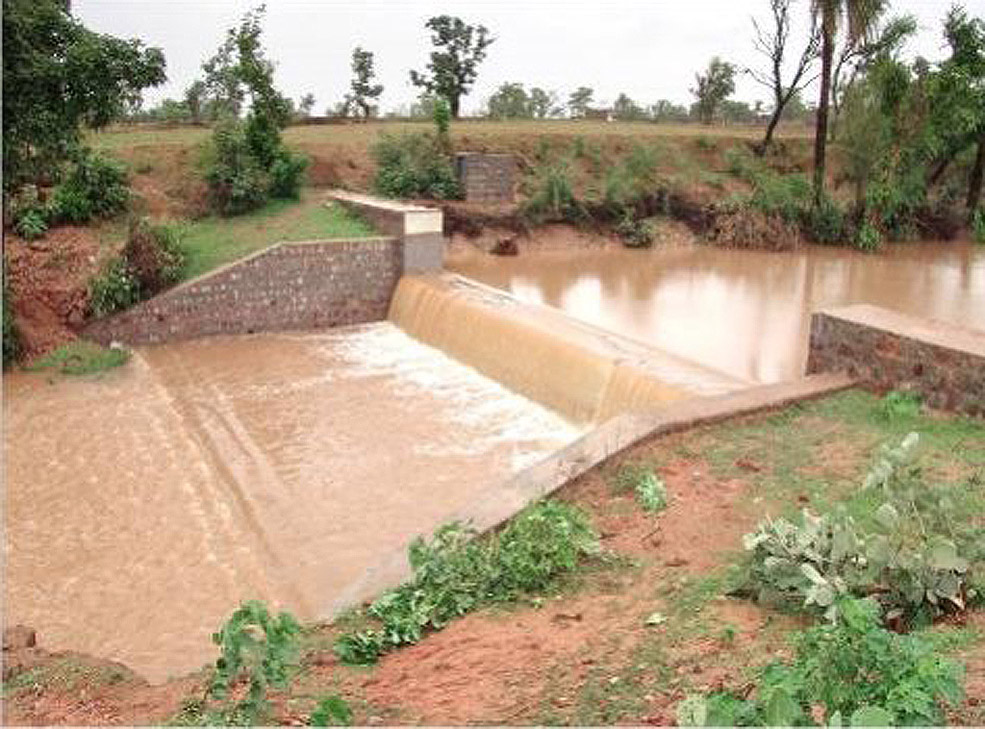|
Power of Collectives
T he International Crops Research Institute for Semi-Arid Tropics (ICRISAT) Model Watershed project in Dhikholi, Damogar and Nayakhera villages of Bundelkhand was started in January, 2009 with the aim of increasing the scope of opportunities available to village people through a participatory watershed development programme. Spread over a geographical area of 1646 ha and treatable area of 1373 ha, this programme i ntegrates cost-effective genetic and natural resources
management and also acts as a site of training. ICRISAT is a monitoring
agency providing technical specifications at the time of cost estimation
and crop demonstration. This project focuses on the construction of a
model watershed with a mandate to protect, conserve and improve the
available land for efficient and sustainable agricultural activities so
as to mitigate the effects of droughts recurring within the watershed
area. The project is implemented through a watershed committee. It
demonstrates how community collectives can act as powerful vehicles for
development. A total of 1000 farmers are presently using improved
technologies, practices, seeds and techniques. Before the project was
started the community had been using old technologies and obsolete
farming practices. Their knowledge of and access to new technologies and
seeds was limited and, consequently, their farm productivity was low. ntegrates cost-effective genetic and natural resources
management and also acts as a site of training. ICRISAT is a monitoring
agency providing technical specifications at the time of cost estimation
and crop demonstration. This project focuses on the construction of a
model watershed with a mandate to protect, conserve and improve the
available land for efficient and sustainable agricultural activities so
as to mitigate the effects of droughts recurring within the watershed
area. The project is implemented through a watershed committee. It
demonstrates how community collectives can act as powerful vehicles for
development. A total of 1000 farmers are presently using improved
technologies, practices, seeds and techniques. Before the project was
started the community had been using old technologies and obsolete
farming practices. Their knowledge of and access to new technologies and
seeds was limited and, consequently, their farm productivity was low.
The locally formed Watershed Committee (WC), through its influence, succeeded in inspiring the villagers to identify and adopt new and resource efficient farming technologies. Practices like dry sowing, line sowing, coco-peat-pro-tray technology, tetra-vermi composting, green shade-net technology and sprinkler/drip irrigation system started being implemented by a thousand farmers in the project area. The Committee also helped farmers to obtain improved varieties of seeds and the result was improved crops. The Watershed Committee members are now engaged in finding out from the farmers in what area they would like to get training, and sending them for such programmes to improve their knowledge. The WC members also provide useful weather forecasts detailing temperature, humidity, rainfall and wind velocity in the area so that the farmers can plan their activities during the season and this has helped in improving their agricultural production through an adjusted cropping pattern. The committee has also created an awareness of climate change among the villagers and promoted climate resilient farming practices. A participatory crop trial on barley (600 acres) and wheat (100 acres) was undertaken with a partial financial support from the Watershed Committee fund. As compared to wheat, barley is a water efficient crop that only requires three cycles of irrigation. Wheat crop requires six. Production and market price of barley is 20 per cent more than wheat. This experiment proved very successful in motivating other farmers in this area to replace wheat with barley. Similarly, the concept of backyard kitchen garden was promoted by the same Committee with the aim of increasing consumption of vegetables by the families residing in the watershed area. A total amount of INR 207,000 was contributed by various community and watershed user groups towards the Watershed Development Fund. Various land and water management practices like agro-forestry, field bunding, check dam maintenance, weather and gauging stations operations, and livestock rearing are financed from this fund. Apart from their work with farmers, the watershed committee also empowers women groups by providing them loans for starting various income generation activities. These groups are now engaged in rearing goats, cultivation of vegetables and selling dairy products. The initiative and motivation provided by the Watershed Committee to the farming community has helped improve lives of farmers and other villagers across the entire project area. It is an inspiring story demonstrating the power of participation and of community groups in achieving change through positive action. q Shiv Bhushan Pandey
|